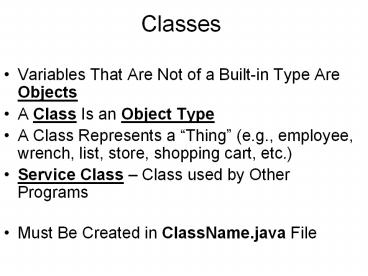Classes - PowerPoint PPT Presentation
Title:
Classes
Description:
Classes Variables That Are Not of a Built-in Type Are Objects A Class Is an Object Type A Class Represents a Thing (e.g., employee, wrench, list, store ... – PowerPoint PPT presentation
Number of Views:271
Avg rating:3.0/5.0
Title: Classes
1
Classes
- Variables That Are Not of a Built-in Type Are
Objects - A Class Is an Object Type
- A Class Represents a Thing (e.g., employee,
wrench, list, store, shopping cart, etc.) - Service Class Class used by Other Programs
- Must Be Created in ClassName.java File
2
Generic Object Declaration
- class useObject
- public static void main(String args)
- Object varName new Object()//instance
- varName.objectMethod() //invoke method
- Instance of Object Type Is Called Invoking Object
of Class Methods - varName is an instance of Object
- varName is invoking object of objectMethod()
3
Creating a Class
- Programmers Define Classes with
- Data Members (or Fields, Attributes)
- Used to store information about each object
- Each member is a variable of some other type
- Methods
- Used to give programmers access to object
4
Designing a Class
- Decide How It Will Be Used
- Decide on Interface (i.e., public representation,
public methods) - Decide on Implementation (i.e., private data and
data manipulation) - Example String Methods (interface) includes
length(), toUpper(), toLower(), charAt(), etc. - Example String Implementation includes
(probably) char variables to hold characters,
integer to hold length (we dont actually need to
know)
5
Constructor
- Class Method of Same Name
- Example class Employee Method Employee()
- Called When Variable Declared (instantiated) of
Class Type - Initializes Instantiated Object
- May Have Multiple Constructors Each with
Different Parameters
6
Access Modifiers
- Used to Identify What May Use Methods
- public any method may use
- private only methods in same class may use
- protected only methods in same class or related
classes may use.
7
Example Class Employee
Employee emp1
String firstName
String lastName
double salary
First and last names and salaries are data
members, or fields or attributes.
8
- //Employee.java file
- class Employee
- private String firstName
- private String lastName
- private double salary
- private final double MAXSALARY 2000000
- public Employee()
- // access to invoking object attributes
- firstName "NoFirstName"
- lastName "NoLastName"
- salary 0.0
9
Employee Declaration
Employee emp1 new Employee()
Main Memory (allocated by new, initialized by
Employee() ) emp1
String firstName
"NoFirstName"
String lastName
"NoLasttName"
double salary
0.0
10
Client Program
- A Program that Uses a Class Is a Client of that
Class - Class Objects are Declared and Instantiated Using
the new keyword. - new ClassName(parameters) Calls Constructor for
Class - Class Public Methods Called Using Dot (e.g.,
variable.GetName())
11
Client Test Program
- class useEmployee
- public static void main(String args)
- Employee emp1 new Employee()
12
Accessor Methods
- Public Methods for Getting Attributes of Class
13
- class Employee
- private String firstName
- private String lastName
- private double salary
- private final double MAXSALARY 2000000
- public Employee()
- firstName "NoFirstName"
- lastName "NoLastName"
- salary 0.0
- public String GetFirstName()
- return firstName
- public String GetLastName()
- return lastName
14
- class useEmployee
- public static void main(String args)
- Employee emp1 new Employee()
- System.out.println("Name is"
emp1.GetFirstName() " " emp1.GetLastName())
15
Mutator Methods
- Class Methods Used to Modify a Class Object are
Called Mutator Methods - Allows Restricted Manipulation of Class Object
Data
16
- public boolean SetSalary(double passedSalary)
- if (passedsalary lt MAXSALARY)
- salary passedSalary
- return true
- else
- return false
17
- class useEmployee
- public static void main(String args)
- Employee emp1 new Employee()
- System.out.println("Name is"
emp1.GetFirstName() " " emp1.GetLastName()) - if (emp1.SetSalary(55000))
- System.out.println("Salary set to 55000")
- else
- System.out.println("Salary not set")
18
Exam 2
- EXAM 2 Monday in Lecture!!!
- 20 of Final Grade
- Know
- loops, switch/case
- Files
- Input failure (e.g. scan.hasNextInt())
- Methods
- Classes
- Everything Through Lecture Wednesday































